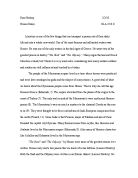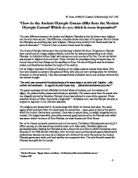Eventually, these myths that were once only told orally were written down. The most famous author to do so is Homer. Homer wrote the Iliad and the Odyssey, among others, and it is from the Iliad that many Mycanaean men looked for inspiration. In the Iliad, it is reflected that the Mycenaean society believed in a very specific role for men and women, respectively. The male role was to devote his life to battle for his country, to lead others, and to have courage even in the face of imminent death. If a man did not die in battle, he was considered to be worthless and unmasculine. The female role in Mycenaean culture was very different: to serve men, at all times. If a woman was not beautiful and did not serve her husband, she too would be considered unfeminine and would be punished by society. Femininity was a very specific stereotype during this time period, and those who did not fit into the generalization were easily ostracized from the rest of society.
Although these myths started as a simple retelling of fact, they grew into motivation and inspiration for men to become war heroes. The heroes in these myths accomplished deeds that no human person could ever attain. These heroic qualities led to everyday men wanting to reach the standard set by the men in the myths. Quite the same was true for women. The female characters in the myths were always beautiful, contained, and served their husbands faithfully. This standard set by the myths provided something for which both men and women could reach. Just as gods and goddesses were created in humans’ image, (they possessed jealousy, envy, and vanity, among others) heroes and heroines were created to inspire humans to reach a higher level of being.
The first hero depicted in Greek myths was Prometheus. He risked his own life to improve the life of others – thereby displaying generosity, bravery, kindness, and unselfishness. Any human man who heard this myth would have tried to attain those qualities. Hercules, another hero in early Greek myths, was described as the strongest man ever. His strength couldn’t possibly be attained by any mortal human being, but simply hearing about Hercules’ deeds made Mycenaean men want to become more like him.
Even women had certain heroines that provided inspiration for them. While most of them were beautiful, meek, and self-contained, one woman who defied all of these traits was Antigone. She followed through with what she believed was morally correct. Antigone was beautiful, defiant, slightly fanatic and certainly eccentric. She still provided some inspiration. Although no women in Peloponessia would even attempt to defy her husband as Antigone did, they might try to be as beautiful and as fanatic about her family as Antigone was.
The myth that most influenced the men and women of the period is the Iliad. This book by Homer describes all the events following the marriage or King Priam to Hecuba, who soon has a baby. Due to a horrible nightmare, Hecuba is advised to carry her newborn son away, to die on a barren mountaintop. The baby lived, and was carried away to another land and named Paris. He grew up healthy and strong, and when he was still young, he was faced with a crucial decision: to determine the most beautiful goddess. Aphrodite bribed him, by promising Paris that the most beautiful woman in the world, Helen, would fall in love with him if Paris picked Aphrodite. Paris gave in to the bribe, despite the fact that Helen was already married. When Paris visits Menelaus and Helen, Aphrodite’s promise came true, and Helen fell in love with Paris. They made their way to Troy, where they were greeted very happily. Menelaus, Helen’s husband, and Agamemnon, Menelaus’ brother, were extremely angry about Helen’s abduction. They vowed to destroy Troy. All of the Greek war heroes sailed to Troy, and they wage war for eight years with no result – Helen was still in Paris’ possession. Finally, Menelaus fights Paris directly, and Menelaus wins, thus winning Helen back. However, all of Troy was not yet destroyed, and all of the Greek war heroes were either dead or suicidal. Odysseus, one of the most famed heroes of the Trojan War, conjures up an ingenious plan to destroy Troy by hiding in a wooden horse – and it works.
Even without reading the entirety of the Iliad one can draw some conclusions about the contributions to stereotypes about men and women from the Iliad. Even in the beginning, when Paris is forced to pick the most beautiful goddess, this shows a huge concentration on the beauty of women – after all, the competition did not determine personality or talent, simply looks. When it is described that Helen loves Paris immediately, one can draw the conclusion that women are always at the mercy of men. The Mycenaeans and Trojans would rather have thousands die than be so cowardly as surrender the battle; and when Menelaus proves he is stronger than Paris, it is shown that the strongest always prevails, and that the strongest always gets the most beautiful.
Perhaps the most obvious conclusions one can draw from this myth is regarding the general place of men and women in Mycenaean society. Men were taught to only live to die. Fight hard, kill many, and die young was the main objective of Mycenaean men. And, as Helen is a metaphor for all Mycenaean women, the objectification of women in real life was probably a huge part of everyday life in Peloponnesia. Above all, women had to be beautiful. The most disturbing part about these myths is the fact that these stereotypes, which began with myths, were passed down for generations. Fathers introduced their distorted place in society upon their sons, as mothers did with their daughters.
The battles and everyday events which were translated into spoken word, which were then translated into written word, fueled many of the Greek stereotypes and pre-conceived notions about men and women. The Iliad in particular propelled the social and moral expectations of the Mycenaeans. And although he lived many years later, Oscar Wilde summarized the Ancient Grecian culture: “All that I desire to point out is the general principle that Life imitates Art far more than Art imitates Life.” The Mycenaean’s culture and everyday life imitated their myths and embroidered stories, which were their most influential and beautiful art form.
Robinson, CE. Hellas: A Short History of Ancient Greece. Pgs. 13 – 15.
World Book Encyclopedia, Millennium Edition. Pg. 567.
The Historians’ History of the World, Volume III – Greece to the Peloponnesian War. Pgs. 66 – 68.
Mahaffy, JP. Social Life in Greece. Pgs. 16 – 17.
Grant, Michael. The Rise of the Greeks. Pgs. 56 –58.
Fleishman, Paul. Dateline: Troy. Pgs. 1 - 26.
Mahaffy, JP. Social Life in Greece, Pgs. 10 – 75.







